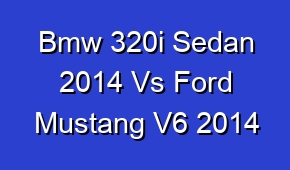Bmw 320i Sedan 2014 Vs Ford Mustang V6 2014

Get ready to compare the powerful performance and sleek designs of the 2014 BMW 320i Sedan and the Ford Mustang V6. Discover which vehicle offers the perfect combination of style and speed for your driving needs.
| Feature | BMW 320i Sedan 2014 | Ford Mustang V6 2014 |
|---|---|---|
| Engine Type | 2.0L Inline-4 | 3.7L V6 |
| Horsepower | 180 hp | 305 hp |
| Torque | 200 lb-ft | 280 lb-ft |
| Transmission | 8-speed automatic | 6-speed manual |
| Drive Type | Rear-wheel drive | Rear-wheel drive |
| 0-60 mph Acceleration | 7.1 seconds | 5.3 seconds |
| Fuel Economy (City/Hwy) | 24/36 mpg | 19/29 mpg |
| Seating Capacity | 5 | 4 |
| Cargo Space | 13 cu ft | 13.4 cu ft |
| Infotainment System | iDrive with 6.5-inch display | SYNC with 4.2-inch display |
| Bluetooth Connectivity | Yes | Yes |
| Keyless Entry | Yes | Yes |
| Backup Camera | Optional | Optional |
| Safety Features | ABS, traction control, stability control | ABS, traction control, stability control |
| Weight | 3,280 lbs | 3,501 lbs |
Engine Type
The BMW 320i Sedan 2014 is equipped with a 2.0L Inline-4 engine, while the Ford Mustang V6 2014 has a larger 3.7L V6 engine. The difference in engine size results in variations in power and performance between the two vehicles.
Horsepower and Torque
The BMW 320i Sedan 2014 delivers 180 horsepower and 200 lb-ft of torque, while the Ford Mustang V6 2014 boasts a more powerful 305 horsepower and 280 lb-ft of torque. The Mustang offers significantly higher performance in terms of power output.
Transmission and Drive Type
Both vehicles have different transmission options. The BMW 320i Sedan 2014 features an 8-speed automatic transmission, while the Ford Mustang V6 2014 offers a 6-speed manual transmission. Additionally, both cars have rear-wheel drive, providing a sporty driving experience.
Acceleration and Fuel Economy
The Ford Mustang V6 2014 demonstrates superior acceleration, achieving 0-60 mph in 5.3 seconds, compared to the BMW 320i Sedan 2014’s 7.1 seconds. However, the BMW offers better fuel efficiency with 24 mpg in the city and 36 mpg on the highway, whereas the Mustang achieves 19 mpg in the city and 29 mpg on the highway.
Seating Capacity and Cargo Space
The BMW 320i Sedan 2014 has a seating capacity of five, while the Ford Mustang V6 2014 can accommodate four passengers. In terms of cargo space, both vehicles provide similar capacity, with the BMW offering 13 cubic feet and the Mustang offering 13.4 cubic feet.
Infotainment and Connectivity
The BMW 320i Sedan 2014 features an iDrive infotainment system with a 6.5-inch display, while the Ford Mustang V6 2014 is equipped with SYNC system and a 4.2-inch display. Both vehicles offer Bluetooth connectivity, keyless entry, and optional backup cameras.
Safety Features and Weight
Both the BMW 320i Sedan 2014 and the Ford Mustang V6 2014 come with standard safety features such as ABS, traction control, and stability control. The BMW weighs around 3,280 lbs, while the Mustang is slightly heavier at 3,501 lbs.




















